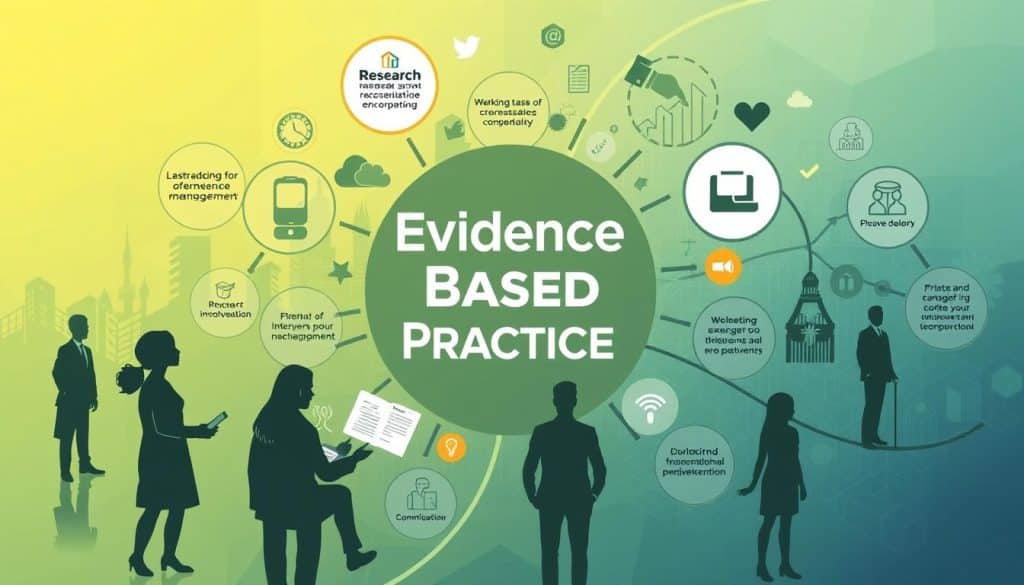“The art of social work is rooted in the science of evidence-based practice,” a principle that guides professionals in their quest for licensure through the ASWB exam. At Social Work Exam Strategies, we understand the significance of mastering evidence-based approaches to pass the exam and excel in the field.
The ASWB exam is a critical milestone for aspiring social workers, assessing their knowledge and application of various concepts, including human development and ethics. Our comprehensive resources are designed to enhance your understanding and confidence.
By focusing on evidence-based practice, we empower you to tackle the exam with confidence and develop a robust foundation for your social work practice. Our structured program, combined with expert guidance, is tailored to help you succeed.
The integration of research evidence, clinical expertise, and client values is at the heart of Evidence-Based Practice (EBP) in social work. As social workers, our goal is to improve our clients’ lives through effective interventions, and EBP is key to achieving this objective.
EBP is defined as the integration of the best available research evidence with clinical expertise and client values to guide decision-making. The core components of EBP include formulating answerable questions, searching for the best evidence, critically appraising the evidence, applying the evidence in practice, and evaluating outcomes. According to the Institute of Medicine (2001), EBP involves a systematic approach to checking research studies for their validity, results, and potential flaws, enabling social workers to choose the most effective interventions.
Our support services, including expert-led training programs, are designed to help social workers understand and implement EBP effectively. By mastering EBP, social workers can develop a systematic approach to incorporating research findings into their daily practice, leading to more effective interventions and improved client outcomes.
| Core Component | Description |
|---|---|
| Formulating Answerable Questions | Identifying specific, relevant questions that guide the search for evidence. |
| Critical Appraisal of Evidence | Evaluating the quality, validity, and relevance of research findings. |
| Applying Evidence in Practice | Integrating research evidence with clinical expertise and client values to inform decision-making. |
Understanding EBP is essential for ethical social work practice, as it ensures that interventions are based on scientific evidence rather than tradition or intuition. By embracing EBP, social workers can advocate for effective programs and policies, ultimately strengthening the profession’s credibility. The ASWB exam tests a social worker’s ability to recognize situations where EBP should be applied and their knowledge of how to implement evidence-based interventions appropriately.
“Evidence-based practice represents a significant shift in the way social workers approach their practice, from relying on anecdotal experience or tradition to using the best available research evidence.”
By incorporating EBP into their practice, social workers can improve client outcomes, enhance their professional credibility, and contribute to the advancement of the social work profession.
Understanding how Evidence-Based Practice (EBP) is assessed on the ASWB exam is crucial for social work professionals. The ASWB exam tests your critical thinking skills in evaluating research findings and their implications for practice. As you prepare for the exam, knowing about research methods is key.
The exam will test your knowledge on many research topics, including both basic concepts and how they’re used in real life. Our support services include practice exam resources to prepare you for the licensing exam changes and study material updates to ensure you have the most current and comprehensive study materials available.
The ASWB exam incorporates EBP questions throughout various sections, particularly in areas related to assessment, intervention planning, and evaluation. You’ll encounter scenario-based questions that require you to identify the most appropriate evidence-based intervention for specific client situations.

Knowledge areas related to EBP on the exam include research methodologies, statistical concepts, program evaluation, outcome measurement, and critical appraisal of research literature. Understanding how to translate research findings into practical applications is a key competency tested throughout the ASWB exam.
Recognizing the limitations of research and knowing when additional evidence is needed before implementing an intervention is also assessed. By focusing on these areas, you’ll be well-prepared for the EBP components of the ASWB exam.

To excel on the ASWB exam, social workers must be familiar with different research methods and designs. Understanding these concepts is not only crucial for passing the exam but also for effective practice in the field of social work. We will explore the key research methods and designs that are frequently tested on the ASWB exam.
Research designs are fundamental to understanding the impact of interventions in social work. Experimental designs involve manipulating variables and randomly assigning participants, providing the strongest evidence for causality. Quasi-experimental designs lack random assignment but still attempt to establish causal relationships, making them practical alternatives when true experiments aren’t feasible. Non-experimental designs, such as correlational studies and observational research, help social workers understand relationships between variables without establishing causation.
Qualitative research methods focus on gaining an in-depth understanding of experiences through interviews, focus groups, and observations. This approach provides rich contextual data essential for culturally responsive practice. On the other hand, quantitative research methods employ statistical analysis to test hypotheses and measure outcomes, offering precision and generalizability valuable for program evaluation.
Mixed methods research combines qualitative and quantitative approaches to provide a more comprehensive understanding of complex social issues. This integrated approach is frequently tested on the ASWB exam, as it leverages the strengths of both qualitative and quantitative methods to offer a deeper understanding of social work practices and interventions.
Understanding the strengths and limitations of these research methods and designs is critical for social workers to critically evaluate research and apply evidence-based practices in their work. The ASWB exam will assess your ability to match research designs to specific practice questions and evaluate the strengths and limitations of different methodological approaches.
Statistical knowledge is a cornerstone for social workers, enabling them to critically evaluate research and make informed decisions. As professionals in the field, it’s essential to understand the basics of statistical analysis to apply evidence-based practice effectively.
Descriptive statistics summarize and organize data, providing an overview of the main features. Measures such as mean, median, mode, and standard deviation help social workers understand client populations and program outcomes. On the other hand, inferential statistics allow professionals to draw conclusions about larger populations based on sample data, a crucial skill for interpreting research studies on the ASWB exam.
The distinction between these two types of statistics is vital. Descriptive statistics provide a snapshot of the data, while inferential statistics enable social workers to make predictions or inferences about a population.
Understanding statistical significance (p-values) and clinical significance is critical for determining whether research findings are meaningful in practice contexts. Social workers must be able to interpret common statistical tests like t-tests, ANOVA, chi-square, and correlation coefficients to apply research findings effectively.
| Statistical Test | Purpose | Example |
|---|---|---|
| t-test | Compare means between two groups | Comparing the effectiveness of two interventions on client outcomes |
| ANOVA | Compare means among three or more groups | Evaluating the impact of different program components on client success |
| Chi-square | Examine the relationship between categorical variables | Investigating the association between client demographics and program participation |
By mastering these statistical concepts, social workers can enhance their ability to critically evaluate research, make informed decisions, and apply evidence-based practice in their work.
Social work research relies heavily on the principles of validity and reliability to ensure credible findings. These concepts are fundamental to assessing the quality of research studies and assessment tools, a critical competency tested on the ASWB exam.
Understanding the different types of validity is essential for social workers. Content validity examines whether an assessment tool covers all relevant aspects of the construct being measured. Construct validity ensures that a measurement tool accurately reflects the theoretical concept it’s designed to measure. Criterion validity compares a measurement tool to an established standard or outcome, helping social workers determine if an assessment can accurately predict client outcomes.
The various types of validity are crucial in ensuring that research measures what it is supposed to measure. Content validity is about comprehensiveness, construct validity is about theoretical alignment, and criterion validity is about predictive power.
| Type of Validity | Description | Importance in Social Work |
|---|---|---|
| Content Validity | Ensures the measure covers all aspects of the construct | Essential for selecting comprehensive assessment tools |
| Construct Validity | Ensures the measure aligns with theoretical concepts | Critical for choosing assessments that accurately reflect theoretical frameworks |
| Criterion Validity | Compares the measure to an established standard | Vital for predicting client outcomes and making informed decisions |
Reliability refers to the consistency of measurement over time and across different raters. Methods to test reliability include test-retest reliability, internal consistency, and inter-rater reliability. These methods help ensure that assessment tools and research studies yield consistent results.

By understanding and applying the concepts of validity and reliability, social workers can confidently select and utilize evidence-based assessment tools and interventions, ultimately enhancing their practice and client outcomes.

Understanding and applying Evidence-Based Practice principles is essential for passing the ASWB exam. To succeed, social workers must demonstrate their ability to integrate research, clinical expertise, and client values into their practice. Our Social Work Exam Prep Online program is designed to help you master EBP and boost your confidence on exam day.
Successfully applying EBP knowledge to ASWB exam questions requires a deep understanding of both the theoretical foundations of EBP and its practical applications. When approaching EBP questions, first identify the client’s presenting problem, then consider what evidence-based interventions are most appropriate based on research support and client characteristics.
The exam often presents scenarios where you must distinguish between interventions with strong empirical support and those with limited or no evidence base. Practice identifying the level of evidence supporting different interventions, from randomized controlled trials (strongest evidence) to case studies and expert opinion (weaker evidence).
Common pitfalls in applying EBP on the ASWB exam include selecting interventions based solely on popularity rather than evidence, failing to consider client preferences and values, and overlooking cultural factors that might affect intervention effectiveness. Another mistake is misinterpreting research findings or overgeneralizing results from one population to another without considering contextual differences.
The ASWB exam tests your ability to recognize when more assessment or information is needed before implementing an evidence-based intervention. By avoiding these common pitfalls and demonstrating a nuanced understanding of EBP, you’ll be well-prepared to tackle EBP questions on the exam.
Developing a targeted study plan is key to mastering EBP content and achieving success on the ASWB exam. To create an effective study plan, you need to identify your strengths and weaknesses in research methods, statistics, and application of EBP principles.
Begin by taking a diagnostic assessment to determine which aspects of EBP you already understand well and which areas need more focused attention. Allocate more study time to challenging concepts like research design, statistical analysis, and critical appraisal of research literature, while still reviewing foundational EBP principles.
Practice questions specifically focused on EBP scenarios help you apply theoretical knowledge to the types of situations you’ll encounter on the ASWB exam. Case scenarios that require you to identify appropriate evidence-based interventions for specific client populations are particularly valuable for exam preparation.
Utilize diverse study resources including textbooks on research methods, flashcards for statistical concepts, and online tutorials for interpreting research findings. Our comprehensive study guides at Social Work Exam Strategies provide targeted content on evidence-based practice with clear explanations and practical examples. Form study groups with fellow social workers to discuss and debate research articles and their implications for practice, enhancing your critical thinking skills.
To further support your preparation, schedule regular practice tests to monitor your progress in mastering EBP content and adjust your study plan accordingly. Visit www.socialworkexams.com for access to our specialized EBP study materials and one-on-one tutoring options for personalized guidance.
Mastering Evidence-Based Practice is crucial not only for passing the ASWB exam but also for a successful and ethical social work career. As you move beyond the exam and into your professional role, the EBP skills you’ve developed will enable you to critically evaluate new interventions and approaches throughout your career.
Evidence-Based Practice is not just an academic exercise; it’s a practical framework that helps social workers address complex client needs and challenging social issues with proven techniques. By integrating research evidence with clinical expertise and client values, you create a balanced approach to social work that respects both scientific knowledge and human diversity.
At Social Work Exam Strategies, we’re committed to supporting your journey from exam preparation to professional practice. Our resources emphasize both passing the test and developing as an evidence-informed practitioner. We aim to help you become a licensed social worker and stay updated with the latest social work licensure updates.
By embracing EBP, you’ll be well-equipped to make a real difference in people’s lives. Visit www.socialworkexams.com to learn more about how our programs can support your continued growth as an evidence-based social work practitioner.